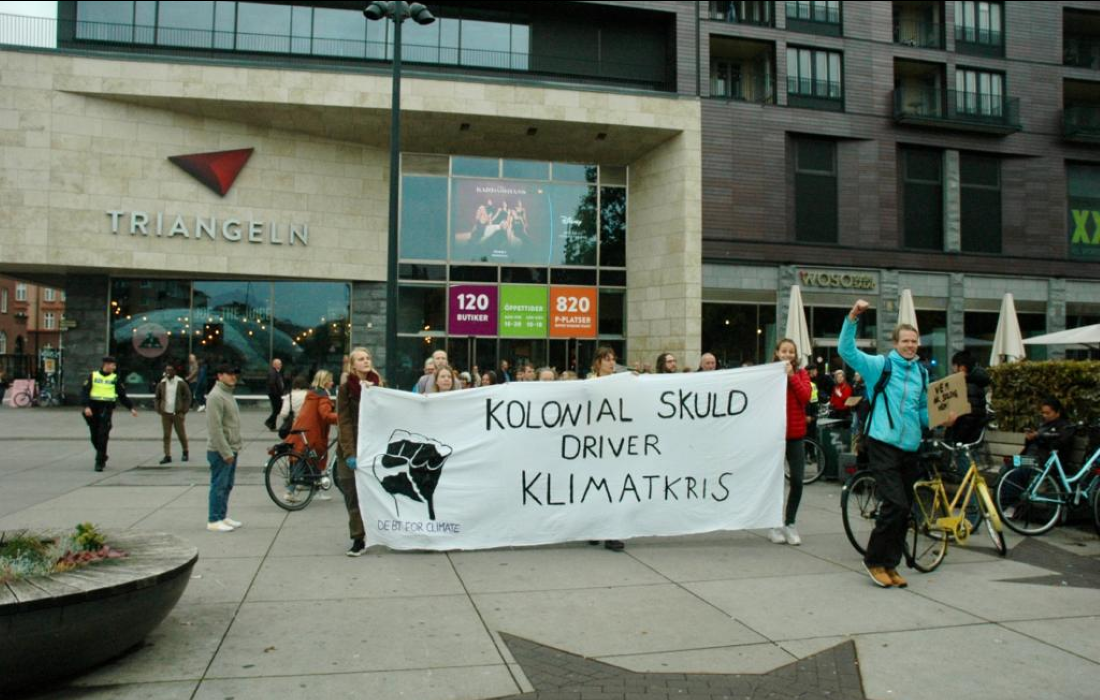

Photo: Maria Fernanda Volponi
Debt for Climate Demonstration - Malmö
By: Maria Fernanda Volponi
20th of October 2022
What is the relationship between colonialism and climate justice?
The worldwide movement Debt for Climate becomes primordial when stressing how colonial structures are responsible for destroying and exploiting natural resources in the Global South for their own benefit, at the cost of underprivileged populations in developing countries. According to climate activists, the Global North must pay their climate debt and demonstrations around the world have been organized to claim for concrete actions.
“Global North, face your responsibilities!” – This was one of the cries coming from climate activists during the Debt for Climate demonstration on the 15th of October at Triangeln, Malmö.
After all, what is climate debt?
The concept was presented during the United Nations Climate Change Conference in 2009. Developing countries demanded their repayment of climate debt.
Climate debt considers how historically significant greenhouse gas emitters, such as the United States and the European Union, have broadly exceeded their fair share of emissions throughout history. The impact on developing countries is huge and their capacity to deal with the consequences of climate change is discrepant compared to developed country’s resources.
It was agreed during the United Nations climate summit in 2009 that wealthy states – the Global North – would provide financial support to developing countries mainly in the Global South in order to reduce the impact of climate change. Starting from 2020, the website earth.org affirms that the proposal was to direct $100 billion to nations in need, however official data has shown that the numbers only reached between $70 to $80 billion. In addition to that, it has been proven that most of this amount was given as financial loans – meaning that the countries have to pay them back in the future.
The quantification of national responsibility for climate breakdown is already estimated. According to studies of 2020, the social cost of carbon is calculated to equate to $51 per tonne emitted, therefore the overall value of climate debt for developing states reaches around $34 trillion.
Debt for Climate movement
This global initiative aims to connect social and climate struggles from the Global South and North in order to demand that the colonial power relation between developing and developed countries be broken. For centuries, this colonial structure has been responsible for exploiting natural resources of the Global South countries. For instance, scientific studies declare that 100 multinationals are responsible for 71% of worldwide industrial emissions. This unsustainable system of consumption is the destructor and its victims from a specific socioeconomic class and place are the ones paying.
Debt for Climate demands that the richest countries of the Global North begin to pay their climate debt, and this encompasses the demands for reparations, loss and damage, and climate finance which must not come in the form of loans but as interest-free payments. Debt for Climate demands the unconditional cancellation of the illegitimate debts, often awarded illegally and unconstitutionally (D4C).
From October 14th (IMF & World Bank annual summit) to November 8th (COP27) organizations around the world have been demanding concrete actions in order to target financial colonialism and turn debt into climate action.
Demonstration in Malmö
Organized by some activists from Extinction Rebellion, the demonstration brought together different organizations, but people with similar purposes.
The action started at 13:00 pm at Möllevångstorget. Drummers were already spreading the word with loud drumbeats of hope. With excitement and cries for climate justice, the action was directed towards Triangeln, calling the attention of people who were passing by.

The action started at 13:00 pm at Möllevångstorget. Drummers were already spreading the word with loud drumbeats of hope. With excitement and cries for climate justice, the action was directed towards Triangeln, calling the attention of people who were passing by.

Emotional speeches were given, songs were sung, messages were painted on the ground. Individuals were dedicating their time for something they believe in. One of the speeches highlighted the importance of remembering who is being affected the most. Voices from the Global South were recalled and emphasized:
Sri Lanka: “Because of this debt, our country can’t take real action on climate. Sri Lanka people deserve decent lives. We deserve to live in an environment that is safe for our animals, our biodiversity, ecosystems and our people.”
Argentina: “We are saying no to the illegal debt of the International Monetary Fund!”
Tanzania: “From the G7 and the Global North countries, we want to stand up for ourselves and be able to rule our economies.”
Nigeria: “We call on the G7 countries to cancel the debt, the global debt drives the climate crisis.”

“What do we want?
Climate justice!
When do we want it?
Now!”

“What do we want?
Climate justice!
When do we want it?
Now!”
Contact
In case you would like to know more or join the fight:


